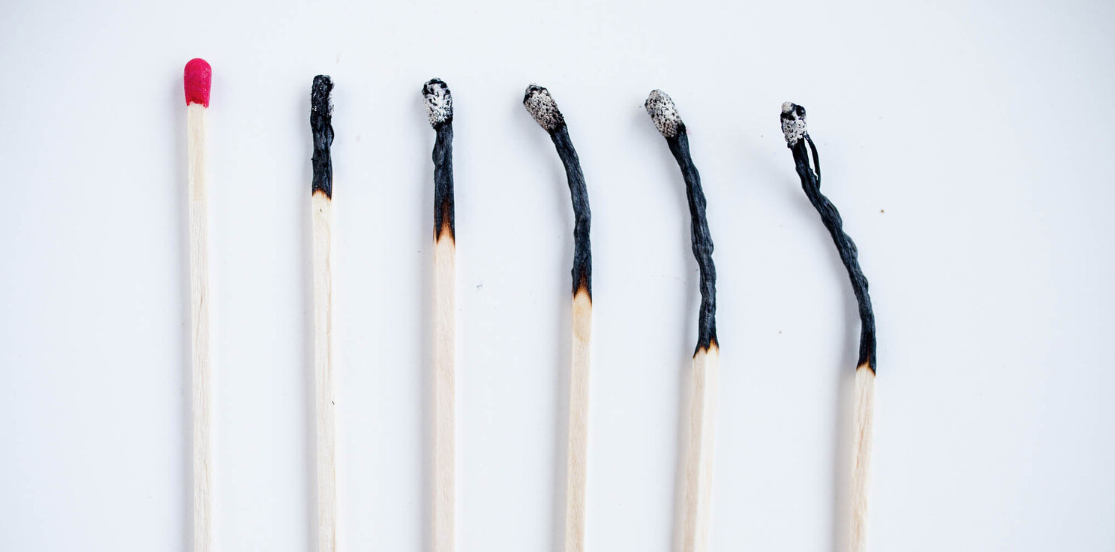What Is Parental Burnout & What Can Be Done?
Defining Parental Burnout:
Similar to a burned out match, parental burnout can be defined as having no energy left to give, complete exhaustion, or depletion of one's resources.
Sometimes parents are so "in it", living day to day in survival mode, that recognizing burnout can be difficult. This is further exacerbated by others generally saying, "oh yeah, me too, that's just parenting". However, if parents are concerned about their energy levels or overall state of well-being, assessing their symptoms and talking to a professional is always recommended.
Signs & Symptoms*
Mild Burnout: A parent who is experiencing an a-typical situation, perhaps a temporarily sick child or partner who is traveling, may show signs of mild burnout. These symptoms may include, short temper and/or limited tolerance, foggy-brain, heightened sensitivity to their emotions and environment, and is usually accompanied by disruptions in sleep patterns.
Moderate Burnout: A parent who is experiencing moderate burnout, perhaps due to prolonged sleep deprivation or other stressors (such as finances, lack of childcare, limited opportunities for self care, etc) may begin to experience additional physical symptoms such as headaches, confusion, forgetfulness, upset stomach, anxiety / depression, feelings of isolation and/or overwhelm. As burnout sets in, communication with others also tends to break down which can lead to an increase in conflict, misunderstandings, etc, especially with the partner.
Severe Burnout: A parent with severe burnout due to long-term exhaustion, stress, lack of physical/emotional/logistical support, and/or physical/mental health complications, may exhibit the above-mentioned signs as well as hormonal imbalance which can further cause a loss of sex-drive, insomnia or dysregulated sleep patterns, and additional health problems. Burnout symptoms may also present as obsessive compulsive tendencies or a multitude of uncompleted/avoided tasks due to overwhelm.
* Please note that these signs and symptoms are not meant to diagnose or treat. Should you recognize these signs and symptoms in yourself and/or if you have concerns about your health, you should contact your medical provider for proper discussion and evaluation.
“You can do anything, but not everything.”
— David Allen
Tips and Techniques
Ideally parental burnout would be prevented by structuring a network of support and self-care, but the reality is, most parents will experience mild to moderate burnout - especially in the early years of parenting.
Communicate with your partner. This may sound obvious, but your partner can be one of the best resources for preventing or healing from parental burnout. It is important to remember that even if you have been with your partner for years and you have a great relationship, no one is a mind-reader! Be specific when you ask your partner (or anyone) for help; “I would really appreciate a tuna sandwich with a tall glass of water” is easier for your partner to accomplish than trying to figure out what “I haven’t eaten since yesterday” means in regards to providing help.
Prioritize sleep. We all know that sleep is essential for health and healing, but patterns of sleep are often drastically changed with children! While a solid 8 hours of unbroken sleep may not be realistic, prioritizing sleep and taking / creating opportunities for rest, is an important part of preventing or recovering from parental burnout.
Taking a family nap, asking a partner / family member / friend to babysit so you can rest, utilizing a Respite Room, and/or hiring professional help (babysitter, nanny, postpartum doula, etc) are some options for obtaining more sleep. Alternatively, limiting your obligations and reducing your daily expectations (for instance, that giant pile of laundry that has yet to be folded….leave it unfolded) are also ways to prioritize sleep.
Take care of your body. The last thing most people want to do when they are exhausted is to exercise (and if severe burnout is present, vigorous exercise should be cleared by a health provider), but being active can boost energy, raise feel-good hormones, and more. Exercise doesn’t have to mean an hour in the gym each day, it can be as simple as going for a walk with your pet, playing a game of tag with your kids, or taking time to stretch your body daily. Combining exercise with your support network is also a great way to further enhance your self-care!
Additionally, what you put into your body can hinder or help parental burnout. When parental burnout sets in, parents often reach for caffeine and sugar as a quick energy source, but eating nutrient-dense, healthy, food choices will provide more ideal fuel for your body than a cold cup of coffee and your kids’ leftover waffles in the morning. Order groceries / meals online, ask a family member / friend to make a meal for you, and/or work with a registered dietitian (which is often covered by insurance) as some ways of ensuring healthy food is readily available when hunger strikes.
Researchers Isabelle Roskam and Moïra Mikolajczak have been studying Parental Burnout in France and have developed a test to help determine “Am I Suffering From Parental Burnout? ” Knowledge is power! Determining your level of burnout may help you prioritize your needs and seek support.
Dr. Oscar Serrallach, researcher and author of The Postnatal Depletion Cure, has developed an acronym for overcoming burnout and can be immediately implemented. Using Dr. Serrallach’s method to identify what your true needs are, it is more likely you will be able to fulfill them.
S = Sleep
P = Purpose
A = Activity
N = Nutrition
Need a personalized plan, strategies, and support for combating parental burnout?
Most parents experience mild, moderate, or severe exhaustion in the early years of parenting. This one to two hour session will help you determine realistic strategies, solutions, and support for replenishing yourself. By doing so, you are optimizing your relationships with your partner, your children and, most importantly, yourself.
Additional Resources for Support
Listen as Krista Maltais discusses Combatting Parental Burnout on the Grow Yourself Grow Your Marriage Podcast
Relief Doula Agency In-Home Postpartum Doula Support
Parental Burnout Publications
The Postnatal Depletion Cure
Sweet Sleep
“The preservation of health is easier than the cure of the disease.”



